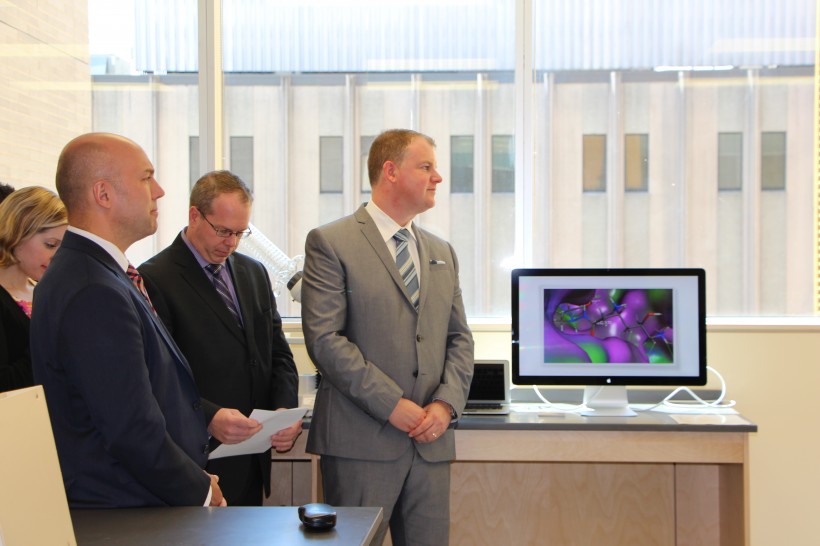Kevin Sullivan had the pride of a guy showing off his new Cadillac. But it wasn’t a car he was displaying, it was the new laboratory that his company had recently moved into.
The company is Halifax-based drug discovery outfit Appili Therapeutics Inc., which in May announced $3.3 million in funding, comprising equity, debt and grants. On the same day, Sullivan unveiled the company’s new lab in the Innovacorp Enterprise Centre in Halifax and introduced the team of PhDs working for the company. A month earlier, Appli had announced it received a special fast-track approval designation from the Food and Drug Administration.
Not bad for a company that began last year.
“Appili is a company that hasn’t been around long, and coming from where they started to where they are today is truly impressive,” said Scott Moffitt, the Managing Director of BioNova, the life sciences industry association in Nova Scotia.
Appili is a notable company because of its leadership, its strategy and the story of how the company came together. Sullivan is a businessman operating in a segment that is often known for the high concentration of academics. He’s raised more than $40 million for various companies, and he brings a deep expertise in developing new drugs.
DMF Medical Preps for 2017 Launch
Sullivan came to Nova Scotia in 2013 to take the helm at DeNovaMed, a Halifax company working on a cure for antibiotic-resistant viruses. He had previously spent 10 years (including four as COO) with London-based Viron Therapeutics Inc., which was developing a cardiovascular drug. Viron raised more than $35 million in equity and non-dilutive capital and took its lead product through Phase 2 trials.
During his work in the biotech field, Sullivan met up with Brian Bloom and Jolyon Burton, the principals of the Toronto-based healthcare-focused investment boutique Bloom Burton & Co. Together, they decided to form a company in Halifax headed by Sullivan that would develop drug candidates.
The first is ATI-1501, which aims to remove the nasty taste from an existing drug that treats Clostridium difficile infection, or CDI, an urgent antibiotic-resistant bacterial threat that causes 29,000 deaths annually. A drug called Metronidazole has been used to treat the condition since the 1970s, but kids with CDI don’t want to take it because of its dreadful taste. ATI-1501 removes the bitter taste.
The Food and Drug Administration recently granted orphan drug designation to ATI-1501, meaning Appili could have an accelerated regulatory path and protection against competition for seven years. The company expects to begin clinical trials next year and have a product on the market in three or four years.
The second drug candidate is ATI-1503, a drug that could fight deadly infections such as Klebsiella pneumoniae. The media is full of warnings about viruses that are resistant to antibiotics and Sullivan said this drug could help combat them, but it’s a longer, riskier project than the first drug.
“We’re now entering a post antibiotic era, where a common cut could be deadly,” said Sullivan. “That’s what keeps us up at night.”
Sullivan described Appili’s strategy as one based on “hitting home runs and singles.” The idea is that the drug for CDI can get to market quickly, but address a limited market. By selling the product, it could produce a steady income stream. That would help to finance the drug for antibiotic-resistant viruses, which could become a blockbuster drug.
The strategy helped Sullivan attract $2.3 million in equity financing in the latest round -- $1.8 million from individuals brought together by Bloom Burton, and $500,000 from Innovacorp. Appili supplemented the raise with funding from the Atlantic Canada Opportunities Agency and NRC Irap.
“This is a seed round,” said Sullivan. “We’ll be looking to go back to the capital markets in the summer and close another round of financing in the fall.”










